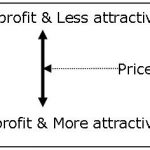Many of our students report strong ups and downs of their cognitive abilities. These variations may be attributed to several factors, one of this factors being stress. It has been shown that stress, especially chronic stress, reduces cognitive functions, including ability to remember things properly. For a superlearner this may well be a vicious cycle. …
Controlling dimensionality of your markers
When we discuss “visual markers” we address some objects that can be processed by the right hemisphere of one’s brain. In fact the distinction between the “left brain” and the “right brain” is not very clear, and visual markers take many forms. By controlling the dimensionality of your visualization you control a complex trade-off between …
Continue reading “Controlling dimensionality of your markers”
How to use negative time: saccade masking and microsleep
Managing pauses when we learn is an important skill nobody talks about. Below is a recommended superlearner strategy inspired by a discussion on our udemy course. Recently there was a very discussion on udemy (below) regarding small pauses we have when we learn. My personal opinion that we should use these pauses as one would …
Continue reading “How to use negative time: saccade masking and microsleep”
Nurturing creative curiosity
Creative curiosity is a driving force not only of superlearning but also mindfulness, positive thinking / happiness, successful career planning, personal finance management. Below are some practical ways to encourage creative curiosity and benefit from it in your life. Recently I read this article about generating curiosity as a way to increase IQ. The challenge …
When you should read slowly
When you mastered speedreading, slow reading is not an easy task. We describe the reasons for slow reading, the difficulties that rise when reading slowly and how to deal with them. Recently I read an article on reading slowly. Reading slowly is a hard task for superlearner. Suddenly you have all this time and nothing …
From C to A in 5 days
Every student wants to have good grades. Every parent wants his child to be A+ students without loosing creativity and joyfulness. In this blog we plan to give some insights on how this can be done. This article is probably the first in series of planned posts that will be generated as we prepare materials …
High-level chunking
High-level chunking allows to operate with up to 80 object in your working memory, using computer-like data structures. Since the size of working memory is correlated with IQ, this actually make you smarter. When dealing with large amount of information you may choose several strategies to encode it. High level visualization is probably the most …
Playful aspects of making markers
Some of our students are extremely driven and focused. Generally these are excellent qualities for superlearner. Unfortunately some of the playful aspects of marker creation require “letting go”. You cannot afford perfectionism when you read at 1000wpm. You should not remake markers when you use high-level visualization or “cartoon” method. You do need crazy stunts …
Memorizing music
Many of our students ask how to memorize music. I am not an expert in this area. Once I produced a disc with jazz songs I wrote, but this is the closest I got to working with music. So I made a short research into what other people suggest. As everybody else I suggest to …
Synesthesia
The subject of synesthesia [when various senses “leak” into each other] was discussed several times during last month. First of all visit this site to learn more about synesthesia. Synesthesia naturally occurs in one out of 2000 people. If you have synestesia you can learn to do this. Moreover you could encode music, taste or …






